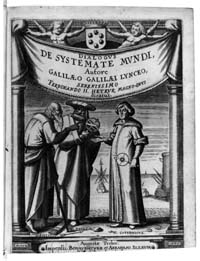Galileo and Books
 Frontispiece from Galileo's
Dialogue on the two chief world systems.
Frontispiece from Galileo's
Dialogue on the two chief world systems.
Image by kind permission of the Master and Fellows of Trinity College Cambridge.
Efforts to try and check the content of printed books began almost as soon as civil authorities, such as the Venetian Council of Ten, began to grant privileges for printing particular titles. In 1479, for instance, Sixtus IV granted the right to the University of Cologne to censor printed books. With the onset of the Reformation, systematic legislation of censorship came in place in Milan, Venice and the Papal States around 1540s with locally produced indexes of prohibited titles. The first Roman and universal 'Index of Prohibited Books' was published in 1559 under Paul V. On the other hand, Martin Luther himself petitioned the Duke of Saxony to prohibit books by Karlstadt.
The Council of Trent reaffirmed the need to censor books, established the Sacred Congregation of the Index of Prohibited Books to administer censorship, and set down rules for prohibiting books. Books could be placed on the Index also by the Sacred Congregation of the Roman Inquisition or of the Sacred Office, administrative units consisting of Cardinals charged with fighting against heresy. Two kinds of books were listed on the Index: books that were pernicious to Catholics and whose sale, possession or printing were prohibited; books that were prohibited under certain conditions, that is, they could be sold, printed, or read after the requisite corrections had been made. Copernicus' De Revolutionibus was placed on the Index as the latter. Galileo's Dialogue on the Two Chief World Systems was placed on the Index of Prohibited Books in 1633 as the former. (It was taken off the Index in 1824.) The Index, however, had little effect outside Italy, Spain Portugal, Poland or Bohemia, as it lacked an effective means of enforcement, and it was abolished in 1966.